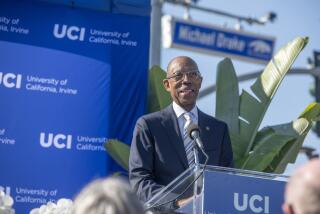In-house pick for provost aims for expanded research role for USC
As the newly named provost and No. 2 administrator at USC, neuroscientist Michael Quick said Monday he wants to help the university use its brain power and growing financial resources to keep improving the school’s reputation and focus high-powered research on societal problems.
“It’s my take that we actually have a moral responsibility to do great things. That inspires me. That’s what I want to work on,” Quick, 53, said between answering congratulatory messages. “I think there are so few places that have the assets we do and can deploy them in ways we can.”
Although 135 years old, USC has become an international player in academic research only in the last two decades, leaving the campus to face fewer of the traditional restraints at universities with longer-standing strong reputations, Quick said.
As a result, USC should break down departmental walls for scholarship and activities in the arts and humanities, in Big Data projects, in joining engineering and science, and in efforts to “improve the study of health across all age ranges,” he said, citing some priorities. USC researchers should help improve cybersecurity and life in mega-cities, among other major issues, he said.
“It’s scary to think about, but it’s also fun,” Quick said.
Quick is well-versed in the complications of USC, a sprawling university with 42,000 students, 3,900 full-time faculty and 2,600 part-time teachers at its main campus near downtown Los Angeles and its health sciences facilities in Lincoln Heights. Among those reporting to him will be USC’s 19 schools, the libraries, student affairs and information technology.
He came to USC in 2002 as a biology professor from the University of Alabama at Birmingham and headed graduate research in neuroscience. His own research focused on drugs’ effects on the signaling properties of nerve cells. He then rose to executive vice provost and vice president for academic affairs.
After conducting a national search, USC President C.L. Max Nikias on Sunday announced the in-house selection of Quick as provost and senior vice president for academic affairs, a position second only to Nikias. Quick succeeds Elizabeth Garrett, a legal scholar who became the first female president at Cornell University in New York last year. Quick and USC officials declined to disclose his salary.
Quick is “an inspiring and tactical leader, demonstrating tremendous foresight, intellect, and resolve in advancing the university’s initiatives,” Nikias said in a statement. Under Nikias, USC has raised more than $4 billion in donations since 2010, with a goal of $2 billion more by 2018.
Quick is “a straight shooter,” said Ginger Clark, academic vice president of the faculty senate and a professor in the education school. “You know exactly where he is coming from.”
Many professors are pleased with his appointment, she said, because Quick seems dedicated to increasing faculty’s role in administrative decisions, a role that now is much smaller than at public universities.
Quick’s challenges include an effort by organized labor to unionize USC’s large adjunct faculty. Quick said he supported the Service Employees International Union’s right to form a collective bargaining unit but said he though faculty employment issues can be better handled without a union.
Since university presidents often travel for fundraising and government lobbying missions, provosts have “the incredibly tough jobs” of running campuses day to day, said Terry W. Hartle, senior vice president of the American Council on Education. It will help USC that Quick “obviously knows the institution very well,” Hartle said.
And he noted that provosts, including Nikias and Garrett, later often become presidents at their current or other schools.
The son of a construction worker and homemaker, Quick was born in Northridge and moved around during childhood as his father landed jobs on tunneling projects. He attended high school in northern Virginia and studied at Oglethorpe University in Atlanta, often working evening shifts at tunneling jobs his father helped him get as a gofer and jackhammer operator.
“It taught me a lot about hard work,” Quick recalled.
He later earned his doctorate at Emory University, also in Atlanta, and did postdoctoral work at Caltech.
Quick, who is single and has two cats, said he regrets that becoming an administrator leaves no time for research. “It can be tough to think I’m not a scientist any more. I’m just a bureaucrat,” he said.
But he intends to continue teaching his course on diseases of the nervous system to undergraduates one semester a year. “It’s fun to get out of the provost’s office and remind us that there are really bright kids who are going to be better than we ever were,” he said.
Twitter: @larrygordonlat
More to Read
Sign up for Essential California
The most important California stories and recommendations in your inbox every morning.
You may occasionally receive promotional content from the Los Angeles Times.











